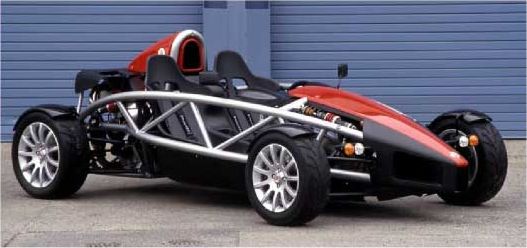The automotive landscape of 2003 witnessed a paradigm shift when Ariel Motor Company unveiled their second-generation Atom. This wasn’t just another sports car — it was a radical reimagining of what a performance vehicle could be. With its exposed chassis and minimalist approach, the Atom 2 challenged conventional wisdom about automotive design and performance.
In an era when manufacturers were adding more complexity and weight to their vehicles, Ariel took the opposite approach. They stripped away everything non-essential, creating a vehicle that prioritized pure driving experience above all else. This bold strategy would prove transformative for the track day scene and performance car design philosophy.
Engineering Masterpiece
The Atom 2’s architecture represents a masterclass in purposeful design. Its tubular steel frame, weighing mere 500 kilograms, demonstrates the power of minimalist engineering. Every tube, every joint, and every component serves a specific purpose — there’s nothing superfluous in its construction.
«The Atom 2’s chassis design was revolutionary for its time,» notes Marcus Thompson, former Formula 3 engineer. «Its torsional rigidity rivaled contemporary race cars, yet it remained serviceable enough for regular track use. This combination was previously unheard of in a road-legal vehicle.»
The exposed chassis does more than just save weight — it creates an intimate connection between driver and machine. You don’t just sit in an Atom 2; you become part of its mechanical symphony. The aerodynamic properties, while minimal, are surprisingly effective at high speeds, generating useful downforce without the need for complex bodywork.
Fact!
The Atom 2's frame requires over 200 hours of precise welding to complete, with each junction point carefully engineered to maintain optimal structural integrity while minimizing weight.
Power and Performance
At the heart of the Atom 2 lies Honda’s legendary K20A i-VTEC engine. This 2.0-liter powerplant, borrowed from the Civic Type R, produces 223 horsepower in naturally aspirated form. However, it’s the 2004 supercharged variant that truly showcases the platform’s potential, delivering an astonishing 304 horsepower.
The performance metrics tell an impressive story:
- 0-60 mph acceleration in less than 3 seconds (supercharged version);
- maximum speed exceeding 200 km/h;
- power-to-weight ratio rivaling contemporary supercars;
- immediate throttle response characteristic of naturally aspirated engines;
- exceptional thermal management due to exposed engine placement.
Important!
The supercharged version of the Atom 2 achieved acceleration figures that wouldn't be matched by mainstream supercars for nearly a decade.
Track-Ready DNA
The Atom 2’s suspension setup reveals its track-focused nature. Independent systems front and rear, coupled with high-quality dampers and springs, provide exceptional feedback and control. The car’s lightweight nature allows for relatively soft spring rates while maintaining exceptional body control.
«I’ve driven everything from F1 cars to Le Mans prototypes, but the Atom 2 provides a uniquely pure driving experience,» shares David Mitchell, professional racing instructor. «Its feedback is immediate and unfiltered — exactly what you want for both learning and pushing the limits.»
The car’s handling characteristics remain remarkably civilized despite its extreme performance potential. Progressive breakaway characteristics and excellent visibility make it an ideal platform for developing high-performance driving skills.
Historical Reference!
The Atom 2's design philosophy influenced several track-focused vehicles that followed, including the BAC Mono and KTM X-Bow, establishing a new category of road-legal track weapons.
Evolution and Impact
The Atom 2’s influence extends far beyond its production numbers. Priced at £24,000 in 2003, it offered supercar performance at sports car prices. This value proposition challenged established manufacturers and inspired a new generation of lightweight sports cars.
Market reception proved overwhelmingly positive, with demand quickly outstripping Ariel’s production capacity. This led to licensed production by TMI Autotech in the United States, expanding the car’s influence globally.
Future-Proof Performance
The Atom 2’s approach to performance has aged remarkably well. While modern vehicles increasingly rely on electronic aids and complex systems, the Atom 2’s mechanical purity offers an experience that remains relevant and engaging.
As the automotive industry transitions toward electrification, the Atom 2’s lightweight philosophy seems more prescient than ever. Its focus on efficiency through minimalism provides valuable lessons for future performance car design.
| Pros | Cons |
|---|---|
| Exceptional power-to-weight ratio delivering supercar performance | Limited weather protection due to open cockpit design |
| Pure, unfiltered driving experience with excellent feedback | Minimal storage space restricts practical usability |
| Robust Honda K20A engine with proven reliability | Spartan interior might not suit luxury-oriented buyers |
| Relatively affordable purchase and maintenance costs | Limited availability and specialized service requirements |
| Outstanding track day capabilities and racing potential | Not ideal for long-distance touring or daily commuting |
| Simple mechanical design allows for easy maintenance | Exposed components require regular cleaning and maintenance |
| Strong aftermarket support and modification potential | Limited theft protection due to open design |
The Ariel Atom 2 represents a pivotal moment in automotive history where less truly became more. Its influence continues to resonate through the industry, challenging designers and engineers to question conventional wisdom about performance car design. For enthusiasts seeking the purest driving experience possible, the Atom 2 remains an uncompromising choice that delivers thrills in their most distilled form.

